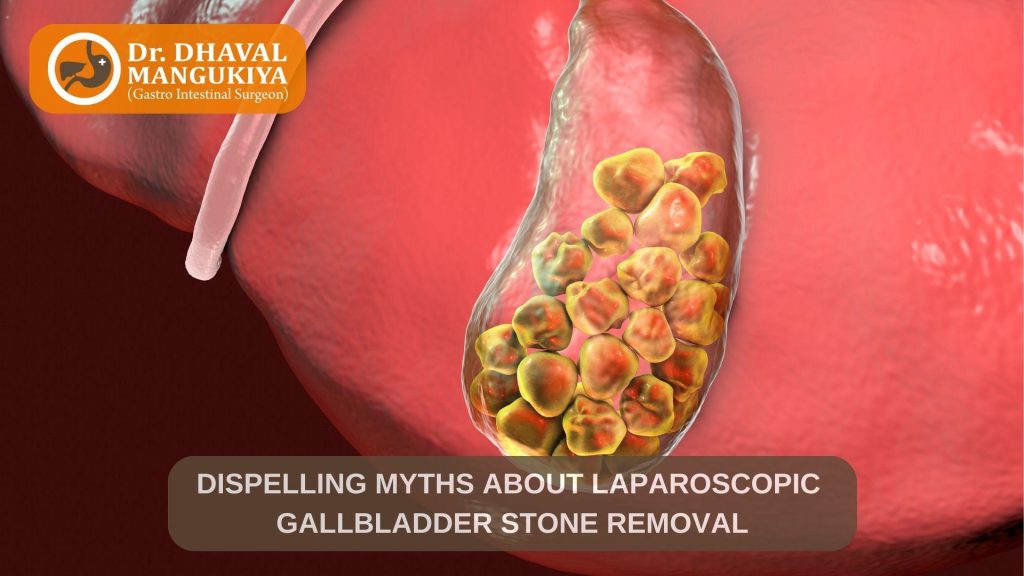The introduction of laparoscopic gallbladder stone removal, also known as laparoscopic cholecystectomy, has revolutionized the treatment of gallbladder disease, offering a minimally invasive alternative to traditional open surgery. However, despite its widespread adoption and proven benefits, certain myths and misconceptions about laparoscopic gallbladder removal persist, often causing unnecessary anxiety among patients. In this blog post, we will address these common concerns, providing accurate information to empower patients with knowledge and alleviate their apprehensions.
Myth #1: Laparoscopic gallbladder removal is a major surgery with significant risks.
This is a common misconception, as laparoscopic gallbladder removal is considered a minimally invasive procedure. Unlike open surgery, which involves a large incision, laparoscopic surgery utilizes small incisions and specialized instruments, minimizing tissue damage and reducing the risk of complications.
Myth #2: Laparoscopic gallbladder removal is only for young and healthy patients.
Laparoscopic gallbladder removal is suitable for a wide range of patients, including older individuals and those with certain medical conditions. The minimally invasive nature of the procedure makes it a safer option for patients who may not tolerate open surgery well.
Myth #3: Laparoscopic gallbladder removal is always the best option for gallbladder stone removal.
While laparoscopic gallbladder removal is the preferred choice for most patients, there are instances where open surgery may be more appropriate. Your laparoscopic surgeon in Surat will carefully evaluate your individual case and recommend the most suitable approach based on your specific condition and medical history.
Myth #4: Laparoscopic gallbladder removal is extremely painful and requires a long recovery period.
Laparoscopic gallbladder removal is associated with significantly less pain compared to open surgery. The smaller incisions result in less tissue trauma, leading to a faster recovery. Most patients can return to their normal activities within a few weeks.
Myth #5: Laparoscopic gallbladder removal will lead to digestive problems and weight gain.
The gallbladder is primarily responsible for storing bile, which aids in fat digestion. However, the liver can produce enough bile to compensate for the absence of the gallbladder. Most patients do not experience significant digestive issues after laparoscopic gallbladder removal. Weight gain is not a direct consequence of the procedure but may occur due to lifestyle factors or underlying medical conditions.
Myth #6: Laparoscopic gallbladder removal is very expensive and not covered by insurance.
While the cost of laparoscopic gallbladder removal may vary depending on factors such as location and healthcare provider, it is generally covered by most insurance plans. The minimally invasive nature of the procedure often results in shorter hospital stays and reduced overall costs compared to open surgery.
Addressing Patient Concerns and Promoting Informed Decisions
Addressing these common myths and misconceptions about laparoscopic gallbladder removal is crucial for alleviating patient anxiety and promoting informed decision-making. Patients should feel empowered to discuss their concerns openly with their surgeons and seek accurate information from reliable sources.
Open Communication with Your Surgeon
Establishing open communication with your Laparoscopic surgeon in Surat is essential for addressing any concerns you may have about laparoscopic gallbladder removal. Your surgeon will provide detailed explanations about the procedure, its risks and benefits, and the expected recovery process.
Seeking Information from Reliable Sources
Rely on credible sources of medical information, such as reputable medical websites, peer-reviewed journals, and patient education materials provided by healthcare institutions. Avoid relying on anecdotal information or unverified sources that may perpetuate myths and misconceptions.
Remember, laparoscopic gallbladder removal has revolutionized gallbladder surgery, offering a minimally invasive and effective treatment for gallbladder stone removal. By dispelling common myths and misconceptions, we can empower patients to make informed decisions about their care and alleviate unnecessary anxiety.

